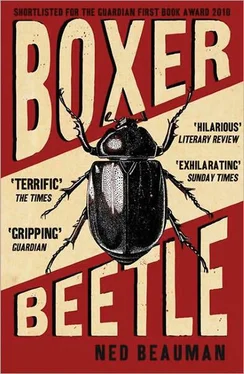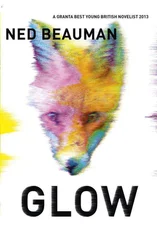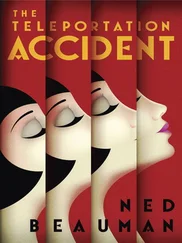‘The lethal chamber is just one of a thousand methods,’ said Erskine. ‘There may be no need for it ever to come into use. You know perfectly well that it’s just sensationalism to identify the whole project with one extreme measure. Imagine if all anyone knew of entomology was you and your cimicids.’
‘Would I be entitled to procreate, then, according to your scheme?’
Erskine had of course already considered this, and the fact was that Gittins was fat, smelly, petty and tedious; not quite a superman. But he’d probably already gone much too far with his comment about the cimicids — it was only their second day, after all — so he just said, ‘I’m sure you’d pass the relevant tests.’
‘Oh, thank you, Erskine, that’s very comforting.’ Erskine had not realised that Gittins was intellectually capable of sarcasm. ‘What frightens me is that perhaps one day I really will have to sit one of those tests, and it will be you who sets the questions and marks the answers, or if not you then perhaps Mr Hitler. I very much hope you grow out of all this.’
‘So I suppose you’d be happy for your daughter to marry some crippled, recidivist negroid?’
‘Well, if they were in love, then it’s not for me to …,’ said Gittins unconvincingly.
‘I suggest you think about that,’ said Erskine, feeling that he had won, albeit not very deftly.
‘I certainly wouldn’t allow my daughter to marry a fellow of your sort. A fellow for whom half the world’s already dead even when they seem to be walking about quite happily. I can’t imagine you’ll have a very pleasant time in life.’
‘Love and happiness are very easy words to invoke, Gittins. But not everyone can do the easy thing. Some of us must do the hard thing if civilisation is to have any future at all.’ Erskine, who knew deep down that he had never really done a ‘hard thing’ in his life, did his best to say this with the requisite gravity, but Gittins snorted, as if exactly the same thought had occurred to him, so Erskine blurted, ‘It’s utter fools like you who are holding everyone back.’ He had never called anyone of Gittins’ age a fool before, and couldn’t look him in the eye as he said it. It wouldn’t have happened but for a whole day of hearing about Hemming. Gittins did not respond, but instead just picked up his Finnish grammar, so Erskine picked up his own book too. An hour later, when the woman came up with the stew, he was still staring angrily at the same page, wishing he’d made a more creditable case than that jibe about the negroid, wondering how it was that an inconsequential argument could so often result in the same congealed adrenaline queasiness as a physical fight. Gittins, meanwhile, had gone straight back to making notes on the possessive suffix as if nothing had happened.
Neither spoke again until Gittins said ‘Good night’ as he blew out the candle, and Erskine stayed silent, feeling there was something subtly derisive about Gittins’ tone. ‘Good night, Erskine,’ repeated Gittins, louder this time. Erskine stayed silent again. The next morning they went out separately into the forest. On their own they could only collect a fraction of what they could collect together, but Erskine was still waiting for Gittins to apologise.
Around noon, wading through a stream, the rain slathering its cold tongue across his shoulders, Erskine snagged his trousers on something and fell over. Splashing around, trying to regain his footing, he felt a pain in his hand and saw blood in the water. He’d got caught on a coil of rusty barbed wire. Towards the end of the Polish — Soviet War, after the Battle of Warsaw, the Poles had laid miles of it in the rivers to stop Bolshevik stragglers from fleeing their dogs. If he hadn’t known that — if Gittins hadn’t specifically warned him about it — he might have concluded that the countryside itself, sick of soldiers, full of scrap, had learnt to grow its own fearsome iron weeds. What other traps would he find in the grass, in the trees? What was he doing here? What the hell did anyone care about beetles, anyway? Shivering, he half-hoped he would get an infection and die, but felt better after putting on a plaster and eating some tinned beef for lunch.
Returning in the evening, he couldn’t face another four hours of excruciating silence with Gittins so he went for a stroll around the village. As before, it was boring, but on his way back he saw, coming out of a stable, the handsome boy from the previous evening. The boy was probably on his way home too, he thought. And Erskine found himself following. He realised then who the boy reminded him of — the individual for whom he felt such ardour, whose face he had last seen back in London. It should have been obvious, but the conversation with Gittins had jogged his memory. It was Hitler.
He didn’t have to follow far before the boy went into a cottage. He waited for a few minutes, then sidled up to the window and tried to look inside. He saw a table and a fireplace. He felt a tap on his back.
He turned. There was the boy. ‘I’m sorry, I was just. …’ The boy said something questioning in Polish. Erskine smiled and nodded, not knowing what else to do. The boy tugged on his sleeve.
There was not much light inside the cottage. ‘Are your parents here?’ Erskine said, pointlessly. The boy said something else, and led him through another door. As he followed the boy into a bedroom with a ceiling so low that he had to stoop, in which a reek of urine overwhelmed the beetroot and the woodsmoke, his heart pounded and he tried not to think about what might be about to happen. But then he saw that the boy only wanted to show him something. Tied to the bed, awake, twitching, the boy’s brother. The angel child. As he stared, it whimpered, or perhaps it said his name.
He had nearly got back to the inn before he vomited into the mud. The rain had stopped. He wiped his mouth and went inside. He now felt very much as if he didn’t want to be alone in this place, so he said hello to Gittins and added, ‘Find much?’
‘Not much.’
‘Nor me.’
Later, they went to bed. There was something about the pure anarchy of dreams that Erskine found very alarming. Dreams were bullies. In the middle of the night he crawled up into wakefulness through thickets of barbed wire, knowing somehow that the barbs were nothing but the buds of flowers, and when he felt that the sheet was damp he thought it must be blood. Then he realised with horror what had happened, and he remembered that before the barbed wire there had been the crooked-toothed boy.
He had been afraid of this ever since he’d found out that he would be sharing a bed with Gittins. He wasn’t worried about the stain so much as the possibility that Gittins was not really asleep and had witnessed Erskine’s murmurs and convulsions. These murmurs and convulsions were only really a speculation on Erskine’s part, but given that boys in his dormitory at school had shouted and kicked in their sleep when all they were dreaming about was a game of football, he didn’t believe that his body could betray itself so revoltingly without giving at least some signal. Of course, he could never know that for sure, any more than he could ever know for sure whether things like this still happened to men of Gittins’ age, or whether, on the contrary, everyone else in the world but him had got their fluids under control long before they even left school. Why couldn’t one just go to the doctor every month to have one’s semen, this irrational fluid, syringed off like the pus from a boil? Perhaps he could ask Gittins all this and then strangle him once he had received some useful answers. In fact, he thought, that was exactly what he would do if Gittins ever acknowledged this episode in any way. At just that moment Gittins shifted, and Erskine had to stop himself from leaping out of bed. Only when the birds began to sing outside did he fall back to sleep again, and as the barbed wire grew over him again like vines he realised that he had not been dreaming before about the crooked-toothed but handsome boy. He had been dreaming about the boy’s brother.
Читать дальше











